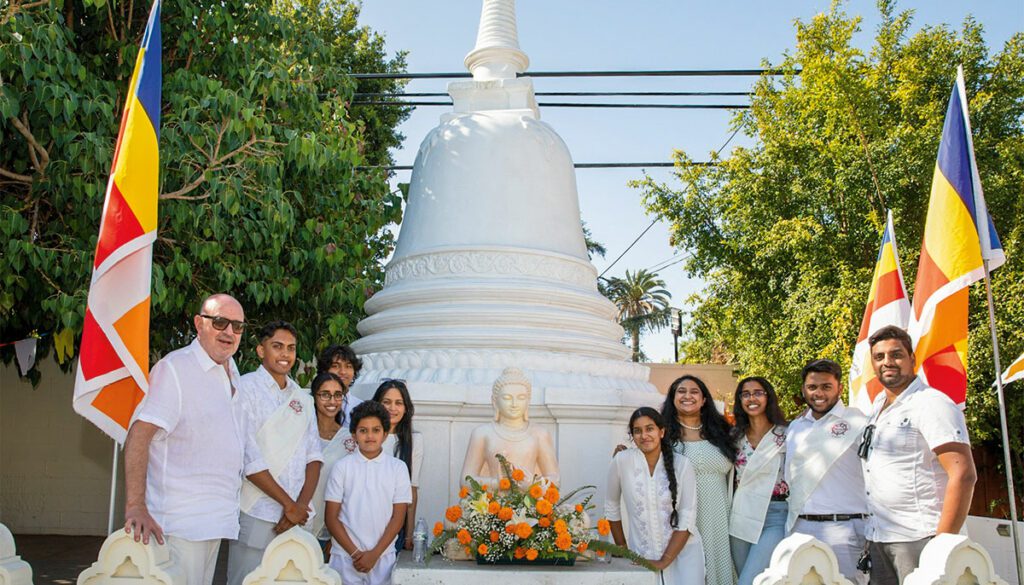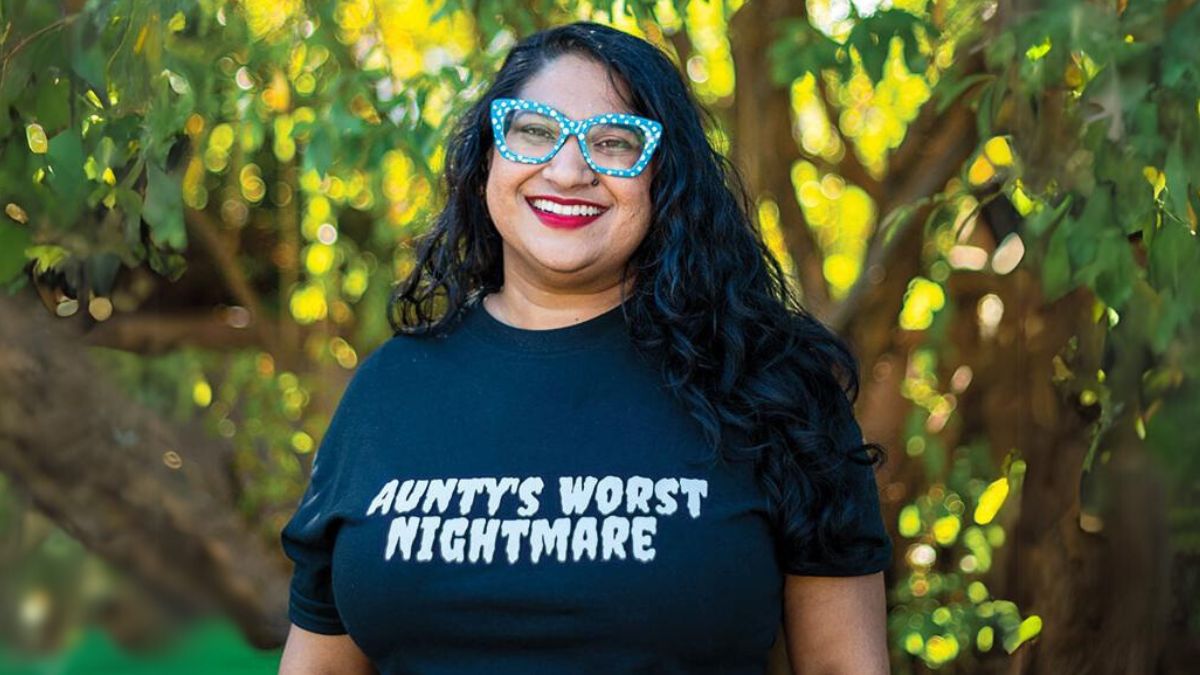I bought a T-shirt that says, “Aunty’s Worst Nightmare.” It’s an accurate description of me in the eyes of many traditional Sri Lankan aunties. I’ll never be an “appropriate” Sri Lankan American Buddhist. I’m unmarried and childfree by choice, I’m loud, I curse, I take up space (metaphorically, physically, and conversationally), and I’m fat. Worst of all, I’m totally content with it!
As a thirty-seven-year-old woman, I’m in a strange transitional phase when it comes to the Sri Lankan American community. For people in their twenties and thirties, I’m “akki,” or “older sister.” For people in their forties, I’m “nangi,” or “younger sister.” But for anyone younger than that, I’ve become Schrodinger’s aunty, simultaneously aunty and not aunty.
A few years ago, while talking to a nine-year-old at my temple, I asked who her parents were. She then pulled her mother’s sleeve, pointed at me, and said, “That aunty wants to talk to you!”
Immediately, her mother’s face turned sour, and she chastised the child: “That’s not an aunty, that’s Mihiri Akki!” I burst out laughing. After I discovered the mom was only five years older than me, I told the kid, “It totally makes sense for you to call me ‘aunty.’ No worries!” The mom looked aghast. As an adult immigrant born in Sri Lanka, she couldn’t conceive of someone with my Valley Girl accent being “aunty.”
As I grow older, my relationship with both younger generations and my temple is changing. This uncertainty in being Schrodinger’s aunty reflects the uncertainties for Asian American Buddhist institutions handling generational shifts.
In my previous role at Lion’s Roar, I met with different Asian American Buddhist communities. One issue that almost always comes up is the question of generational continuity: How do we keep sangha members born and/or raised in the U.S. involved as they grow older?
My temple, Dharma Vijaya Buddhist Vihara in Los Angeles, California, has successfully kept multiple generations of Sri Lankan American Buddhists engaged with our community. While young adults no longer attend Sunday school weekly, they stay involved financially by being monthly donors, attending religious events and festivals, and taking leadership roles. For example, the 2022 Kathina celebrations were entirely organized and funded by former Dharma Vijaya Sunday school students, now in their twenties, thirties, and forties.

What does this mean for Buddhism, where lineage is so vital, that Asian American Gen X, millennial, and Gen Z folks born and/or raised in the U.S. are now aunties? How are we passing on our cultural and religious traditions in unique ways? What does it mean to be an Asian American Buddhist aunty shaping future generations? Well, I’m the aunty now. I get to decide what it means.
For me, auntyhood is an approach to your relationship with others: biological and nonbiological family, communities, and younger generations. Basically, auntyhood is something that you do, so anyone, regardless of gender, can be an aunty. Doing auntyhood—or “auntying”—means accepting, moving forward, and acting with the knowledge that you are now, in this moment, an ancestor. Which begs the question, what kind of ancestor do you want to be? What memories and legacies do you want to leave behind?
Here are four tips for doing Buddhist auntyhood.
Address the Practical Needs of Your Community
On the walls at Dharma Vijaya are two typed lists of donors: one for those who regularly make lunch for the monks, and the other for those who make monthly financial contributions to the temple. The names on the food donation list are all first-generation immigrants, while the monthly financial donors are a mix of first- and second-generation immigrants. In other words, those who were born or grew up in the U.S. aren’t making food for the monks, but they’re still supporting the institution.
Being involved can simply mean helping your temple keep the lights on by contributing to monthly bills. A Buddhist aunty donates what they can either on a regular basis, or only on festival days or holidays. Other ways Buddhist aunties can tangibly help their temple is by buying and donating practical things in bulk, such as beverages and disposable dinnerware.
Use Your Abilities and Expertise to Improve Your Community
In addition to financially supporting my temple, I give my time and energy to my community. I use my teaching experience and Buddhist knowledge to lead lessons a few times a year for Sunday school, and I use my experience in higher education to help Sunday school teens with college applications for free.
We all have our strengths, so use the things you’re good at to get involved. If you’re computer-savvy, help with graphic design or setting up websites and social media accounts for your temple. If you’re a doctor, lead a workshop on heart disease, diabetes, or a specific illness that disproportionately affects your community. If you’re skilled at a sport, start a team for the kids in your temple. If you’re a great writer, musician, or artist, teach some of what you’ve learned to young people.
In volunteering your expertise, you can contribute to the temple community, make a difference, and become a mentor and role model for younger generations.
Maybe you don’t think you have any relevant abilities (which I don’t think is true!). In that case, volunteer your time by helping to set up before festival days. Or just pick up the phone and ask the temple what you can do to help!
Develop a Relationship with Clergy
Developing a working relationship with monastics allows you to both understand your community’s dynamics better and have a say in how your community operates. In doing so, you’re building something for your community now and for future generations.
You can guide monks on their approach to younger generations. If you have kids, offer advice from your own experiences as a parent. Since I’m childfree, I offer my understanding of being born and raised in the United States. You can encourage the clergy to make adaptations to ceremonies and traditions so that Buddhist practices are applicable and relevant to our lives in the U.S.
I adore the abbot of my temple, Bhante Walpola Piyananda. He gives young people leadership roles in the temple, purposefully abandons rigid standards, and has deliberately horizontalized/equalized the relationship between laity and monastics. We’ve had many conversations about temple dynamics and younger generations.
Don’t be afraid to disagree with monks! Auntyhood brings with it a certain level of power, so this is the time to flex it! While I respect monks, I’m not overly deferential. I speak plainly and—if necessary—bluntly, especially when monks have unrealistic expectations for kids growing up in the U.S.
I realize this may not work for everyone. I’ve seen in other Asian Buddhist traditions that access to monastics can be restricted, especially if you’re a woman. In my experience, Sri Lankan Buddhist monks at California temples appreciate that I want to be involved and are willing to listen to my ideas, even if we disagree.
Rethink and Remake Buddhist Traditions
Being involved in your community means rethinking cultural and religious values and remaking them to work within the American context.
When I go to other Sri Lankan Theravada spaces in the U.S., I’m shocked at how fiercely hierarchies, certain traditions, and strict standards of behavior are enforced by immigrant aunties and uncles. They approach their kids’ relationship with the temple as if they were Sri Lankan kids attending a temple in Sri Lanka. As a result, these kids see their temple as a rigid, restrictive place where they’re scolded for breaking rules they don’t understand. When these kids become adults, they stop coming to the temple.
Part of my work as a Buddhist aunty is pointing out to these parents that their kids are Sri Lankan American, and their temple is in America. Doing things such as requiring kids to memorize Pali chants without teaching their meaning is nonsensical for kids growing up in the U.S. In contrast, incorporating English translations of Pali chants into our temple practices allows young people to know and appreciate their traditions.
Though I’ve fully leaned into my Buddhist auntyhood, I don’t have the answers to the problem of generational continuity that Asian American Buddhist institutions are facing. But I’ve noticed that when temples encourage younger generations to feel a sense of ownership over their temple, they’re more willing to participate and contribute as adults.
Ultimately, being a Buddhist aunty is about feeling comfortable and owning your belonging in your community. The Buddhism my friends and I grew up practicing is different from the Buddhism in Sri Lanka. Regardless, we call it “our heritage.” Part of being in diaspora is getting to decide for ourselves what “heritage” and “tradition” mean. Those of us who grew up in the U.S. forget that our temples truly are our spaces. We’ve been part of these institutions for years and decades longer than recent immigrants. So, take ownership of your place in your community! Embrace the power of being a Buddhist aunty, go forth, and make a difference!
This article is from the March 2024 issue of Lion’s Roar magazine.

